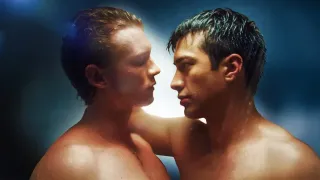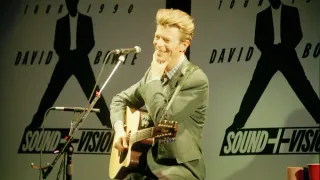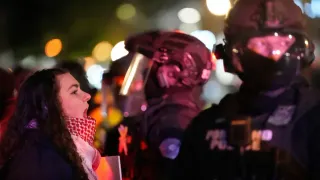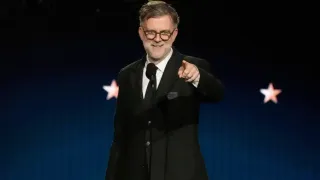April 21, 2015
Fascinating People :: Rachel Garlin
Kilian Melloy READ TIME: 13 MIN.
A few years ago, after hearing Rachel Garlin's CD "Bound to Be Mountains," I was thrilled at the prospect of interviewing her. Garlin, a Harvard graduate, was planning to be in town for some live performances.
Though the interview didn't pan out, the CD remained a favorite. Stuffed with lovely sketches that deal with everything from a romantic trip to Jamaica to the tale of a Jewish child left in the care of Christian foster parents "while [her] mother took a wartime gig," to a long-term couple making a humble, but happy, home in their "broke down house," the songs on that CD spoke to the essentials of the human condition: Memory, aspiration, love.
That was several albums ago, and Garlin -- who, with her wife, is also the mother of two -- has continued to hone her craft. The result? Her new CD, "Wink At July," is just as bountiful with rich songwriting and salt-of-the-earth storytelling. Better still, I finally got that interview.
Dear readers, the fascinating Rachel Garlin.
EDGE: Let me get the fanboy stuff out of the way straight off and tell you that "Bound to Be Mountains" is one of my all-time favorite albums. Your website notes that your albums -- five of them now, with the recent release of "Wink at July" -- "feature songs noted for vivid, lyrical imagery," and I have to agree with that description of your songwriting.
Being as how "Bound to Be Mountains" is such a fave, may I ask you about that album before moving on to the current release? The word that comes to mind no matter how often I listen to "Bound to Be Mountains" is "comfort." It's like the musical version of cornbread with honey -- wholesome, straightforward, delectable. What determined your decision to keep the sound clean, and eschew overproduction or fancy engineering?
Rachel Garlin: Hello! It's a pleasure to chat with you as well, and it's a treat to know that "Bound to be Mountains" has stayed with you as a comfort and companion over the years.
For that earlier recording, I was really just interested in playing the songs first and adding any production later. Usually, Ben Wisch (the producer) and I would just sit in his lower-Midtown studio and play through the songs together and capture any initial guitar/vocal takes. Then, I'd go back in and improvise some harmonies, add a shaker or two and sometimes be done at that.
On other songs, where we wanted to create more textures, we were able to bring in players like Glen Velez on percussion and Tony Levin on bass while still keeping the production sparse. I guess when you're in the middle of Manhattan and there are walls of sound all around you, there's an instinct to just pare it down to the essentials.
EDGE: That sound is also a signature of the new album, "Wink at July." The same sense of rhythm and flow is there, along with gorgeous melodies, especially in "Accordion Song" and "Spin," and some great rhythm-driven songs like "This Winding Road." What prompted the new album? Life experiences? Books? Where do you draw your inspiration?
Rachel Garlin: The new songs came in fits and starts, usually in groups of three, and loosely coinciding with the seasons for some reason. So "Wink at July" was first and I wrote it in June while looking forward to the due date of our second son, which happened to be July 20th, and "Moon Day"... the anniversary of the first moon landing. There, I was inspired by the ways in which lives are punctuated by big moments (moon landings, baby births) and small moments (book clubs, favorite bakeries, and renting tiny but satisfying apartments in the middle of a big city).
So that's the last song on the album, and it's winking at the first song on the album, "Gwendolyn Said," with my favorite quote from Gwendolyn Brooks: "Exhaust the little moment, soon it dies."
The song "Gwendolyn Said" came from my memories of high school, riding the public bus to school and looking up at the billboard poetry that was posted over our heads on the buses. I think of it as a retrospective-come-topical song only because Gwendolyn Brooks (an American poet who was the first African-American to win a Pulitzer Prize) wrote largely about civil rights struggles, justice and equality, and here we are addressing these same issues today. So it's a personal take on what it's like to be young and on a bus and finding your way in a complex world.
Several of the other songs came directly from conversations... words exchanged in letters ("Dear Friend"), philosophical nudgings from others ("Spin"), feeling a sense of kinship with artists ("Up on a Ladder" and "Keith Haring") and words said and unsaid ("Accordion Song").
Let it be no secret that I love words. I love them so much. I love to take them out of their boxes, build them into towers and then knock them over and watch them fall, crack, fail, flounder or fly. So much of my writing process starts with improvisational story-telling and word play, and the words that stick around are the ones that manage to convey ideas and images but also just feel good to me when I sing or say them. I learned that concept from a songwriting workshop with Patty Larkin, who said she would sometimes choose lyrics just based on how syllables felt in her mouth. I think that Paul Simon might do that sometimes, too.
EDGE: There are some songs here that have a real biographical ring -- I especially like "Stranded," and "Flying Together" is sweet. You seem to have a talent for unfolding nuances of meaning and feeling from life's ordinary moments.
Rachel Garlin: Thank you. Yes, you are right about the bits of biography that infuse those two songs. For "Stranded" it was a situation where I was looking back on something... specifically, my very first year of teaching, when I was 22 and placed in an "under-resourced" school in South Phoenix to teach third grade. Our building was so close to the newly built Sky Harbor Airport, that our school had to be literally put underground in order to avoid the tremendous sound from the runways and surrounding skies.
From above, our school just looked like a black-topped basketball court on top of a grassy mound, but inside there was plenty of learning and laughter, albeit in a windowless environment somewhat removed from the action outside. My 8- and 9-year-old students were bright, and kept me on my toes as I found my way in a new profession. I did home visits so that I could meet all of the families and get to know the neighborhood better. Some of my students had fathers who were incarcerated, and it was during the era of a state-wide campaign to shame prisoners by providing them with prison garments and boxer shorts that were all dyed pink.
It took me a long time to really see and come to terms with all of the strange contradictions of that time. Last summer, I was playing the piano - something new for me - and I felt that same sense of "beginner's mind" that I felt when I was a first-year teacher in Phoenix. I wrote "Stranded" while piecing things together from that time.
On an even more personal note, I wrote "Flying Together" while watching my wife care for our kids and care for her parents, while trying to keep it all together. Facing news of a parent or grandparent who is ill is not easy for anyone, and with little kids, you have to strike the balance between telling them that everything is okay and nothing is okay.
EDGE: Speaking of having kids, how much does being a parent feed into your artistic work, versus taking time and energy away from songwriting? Looking back at the songs you were writing prior to becoming a parent, do you feel there's a vast difference between the work you created then versus now?
Rachel Garlin: Hmm. Good questions. I definitely love playing music with and around my kids. This often boils down to us going into our garage-turned-musical-playroom and jamming on various instruments and having fun.
When I'm actually writing a song, though, I pretty much have to be alone. And I don't just mean alone in a room... I really prefer to be totally alone in the house or holed up somewhere. So that part has definitely become more challenging (post-kids), since our house is not exactly a sanctuary of peace and quiet.
I carved out a small writing space/studio under the stairs in the garage that you can enter through a recycled photo booth (a real one!) that I scavenged from the free box listing on Craigslist?. So when I manage to find time alone at home, I usually go down there and start by strumming chord progressions on my guitar and then telling a story, musically, or improvising lyrics and free-writing as much as possible. I try not to censor myself at all during the first stage of writing, and so as you can imagine there's a lot of material that goes nowhere, directly, but in an indirect way it leads to me to the stuff I keep.
As a parent, I see my kids involved in "free-writing" all the time, as they tend to just say what's on their minds and wouldn't think of censoring themselves or being self-conscious or really being anywhere except in the moment (and preferably covered in paint, wet sand, or noodles). So perhaps my own writing has become freer, and I'm more inclined to follow threads without judging them first.
But back to your actual question, I don't know that there's a vast difference in my songwriting from before and after having kids, even though I know that being a mom has changed me and made me feel more grounded and generally happier.
EDGE: What do your kids think of having a singer for a mother? -- Other than they are lucky to have someone to write lullabies for them?
Rachel Garlin: They're still pretty young (4 and 2), so some of my musician identity is a bit abstract to them. But they know that I love to write songs and that I record and perform them. I truly believe that all kids are inherently musical, and I'm lucky that my kids are not proving me wrong on that, so far. We jam hard. And our garage opens right onto the sidewalk of a busy street, so it's not uncommon for us to have spontaneous garage concerts at dusk, or 7 a.m. jams for the early risers (picture weary-eyed, coffee-bearing parents passing by with infants in strollers and stopping by to listen or join in for a spontaneous toddler jam).
I want my kids to feel the community aspect of live music, to have as many opportunities as possible to just be immersed in a musical room and feel the joy of people playing music together. So far so good!
EDGE: On that note, "Wink at July" and "Up On A Ladder in Boots" both have a bit of a lullaby feel to them -- to my ear at least. Or am I mistaken about that?
Rachel Garlin: Funny you should link those two together, because they both have a waltz-like element that probably makes them lullaby-esque. "Wink at July" is in 3/4 and "Ladder" is in some version of 3/4 and 6/8 (the same meter as "I want to be in Am-er-i-ca" from "West Side Story").
In fact, I wrote "Ladder" after asking my middle school songwriting students to write something in that meter. I usually do their assignments too, and voila: "Up on a Ladder" was born. And there's another connection too, something you couldn't possibly have known, but the chorus of "Wink at July" describes a painting with "layers of maroon and a little grey moon." It's a painting that hangs at the top of our stairs and that we bought directly from the artist (Lynn Rubenzer) after visiting her in her art studio at the Hunter's Point Shipyard in San Francisco. "Up on a Ladder in Boots" was actually inspired by that meeting with Lynn and that visit to her studio... so I think you are onto something.
EDGE: Do you have a sense that with the growing acceptance of lesbian and gay-headed families same-sex parenting is becoming easier?
Rachel Garlin: Yes, I do think that is true. I think of it mostly from the perspective of the kids who now have the opportunity to see many more representations of their family structures, both in the communities around them, and also in the media. I still think there could be more books, music, etc. that present same-sex parents as a normal model of family living, rather than pointing to them as an alternative lifestyle. We're on the right path, and mostly I feel fortunate to be living in this time of rapid progress.
EDGE: I love that you have a song on this new album called "Hey Keith Haring." Is this a bookend in any way to your earlier song, "Hey Garrett," which is a tongue-in-cheek riff on a young woman missing a kind of useless ex-boyfriend?
Rachel Garlin: I love that you know my catalogue well enough to make that possible connection! Thanks for pointing that out. I don't know that they are intentionally linked in any way, except that maybe, yes, Garrett and Keith are both real men from my past (only one of whom I ever met in person), and I look back on them fondly, with a certain romantic yet platonic admiration and gratitude for how they figured in to my own coming of age.
Growing up in Berkeley, I was surrounded by social activism of many sorts, but Keith Haring's art was one of the first entities that I came to on my own, different from the classical art and political posters that I grew up with at home. Here was an artist that was speaking to me and my classmates as we came to learn about the AIDS crisis, as we lost teacher after teacher to the disease, and as there was a continued silence around what was actually happening (no one told us why our teachers kept taking long sick leaves and then not coming back.)
Keith Haring T-shirts were a wake-up call with slogans like "Silence=Death" and vibrant images of primal life and it made an impression on me. Plus, as a fellow artist, I just hugely admire his process, how he would face up against a large canvas and just keep drawing and painting until it was done, rarely stepping back to over-analyze, critique or self-judge but focusing on keeping the process loose and in motion.
EDGE: "Colorado Rain" has a real bluegrassy feel to it, especially in the vocals, but also a bit of a rockabilly flavor -- and a Johnny Cash sort of sound in a few places. You've mentioned before that Suzanne Vega has been an influence, but are the pioneers of rock, like Johnny Cash, and Roy Orbison, and Buddy Holly also an influence on you?
Rachel Garlin: This was one of the last songs I wrote for the album. It came along in the summer (along with "Hey Keith Haring" and "Stranded") after I learned that an old friend of mine had gone through a hard time, or at least endured some life changes that might have been challenging, and wanted to reach out but also felt overwhelmed about how much each of us had to catch up on. I just wanted to bust through the distance, the hourglass of time, and be in the moment again. How to do that over a span of both space and time felt overwhelming but ultimately liberating and simple.
The song style might have come from any number of influences, including Nanci Griffith, the Indigo Girls, Patty Griffin, Emmylou Harris, as well as the ones you mentioned, but with whom I've spent less time, musically. Honestly, I think a lot of the feel came from James DePrato (from Chuck Prophet's band) who came into the studio and played mandolin. We played that song live, together as a full band, and didn't go back to change much at all. I wanted it to be live and in the moment.
EDGE: Any number of GLBT singer-songwriters are now living and working openly -- you, Tom Goss, Melissa Etheridge, Matt Alber, Sam Smith. Is the music industry shifting as rapidly as it seems to be, or is there still homophobia behind the scenes, in the executives' offices, and so on? (And do emerging new models of production and marketing make this shift possible?)
Rachel Garlin: As an indie artist, I tend to take an optimistic view on things and feel fortunate that I get to make music on my own terms and connect with fans who understand personal identity as just one facet of what an artist presents.
I think the shifts in the mainstream industry are rapid in a couple directions (toward women, LGBTQ, trans community and other traditionally marginalized groups), but that there are likely still certain roadblocks in the more traditional channels of music production and distribution. I recently wrote an opinion piece for The Bay Times as a way of thanking Cris Williamson and other women who forged the way for a more open industry.
I think a big change today involves the fact that women artists or LGBTQ artists don't have to exist in a subculture, but have the option to integrate more comfortably into the mainstream. With this change, some things are gained, and others lost, I suppose, since subcultures can be wonderful breeding grounds for innovative and powerfully non-conforming works. But the new models of production and the openness of internet channels are a key factor in letting fans, and not just industry gatekeepers, make decisions about what they want to hear.
EDGE: By the way, although you and Goss and even, say, Joan Armatrading might fit the general category of "folk," it seems like there is a huge presence lately of gay country and western performers; kd lang started out as country, and Ty Herndon just came out of the closet, and then there are stars like Chely Wright, who came out in a big way, and Steve Grand, who basically started out by kicking down the closet door. What is going on there? Any ideas?
Rachel Garlin: As more people come out, I think that every genre will find that there are LGBTQ artists in their midst already. Coming out is a personal process, and timing is different for everyone, but I certainly think that the numbers game helps: The more people come out, the more people come out. The younger generations of music listeners have made it pretty clear that they are not going to discriminate against artists who come out, so I think that every genre will become more diverse (in terms of artist identity) across the board.
EDGE: I reckon I have talked your ear off enough for now... but I am very much looking forward to continuing our conversation.
Rachel Garlin: I very much appreciate both the thoughtfulness of your questions, and your continued interest in my music and songwriting process over time. Thank you.






